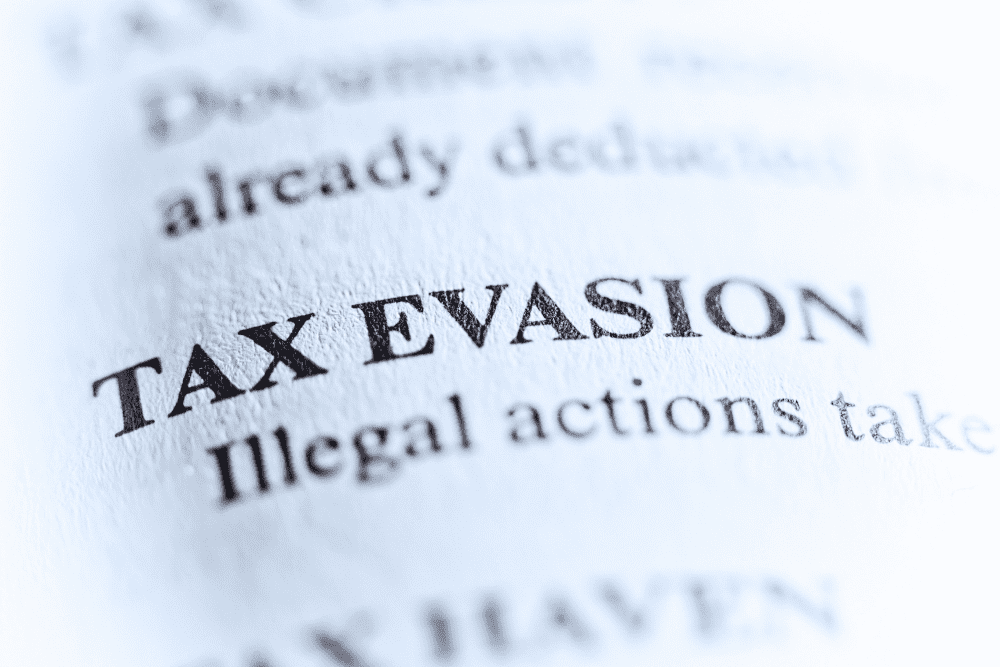- Home
- THE FIRM+
- Criminal Defense+
- CASE RESULTS
- AREAS WE SERVE+
- FAQ’s
- Blog
- Contact
AZHARI LLC BLOG

Posted By: Sami Azhari
Category:
Taxes can cause a lot of confusion, especially when financial situations get complicated. Still, most Americans understand their minimum obligation to file and pay taxes each year. While the world won’t come to a halt if you don’t make the federal deadline, failure to file and pay your taxes can lead to legal consequences down the road.
In Illinois, failing to file or pay your taxes are both crimes, and there are penalties associated with each. Here’s what you need to know.
Is It Tax Evasion?
Tax evasion occurs when someone avoids paying their tax liability deliberately. Willfully failing to pay your taxes can be a criminal offense, and it can result in substantial penalties as well.
Tax evasion can happen in several ways, such as:
- Neglecting to file tax returns
- Neglecting to report all income, including cash
- Underreporting your total income
- Falsely claiming or inflating any charitable donations made
- Underreporting or omitting property values
Tax evasion does differ from tax avoidance. To provoke a tax avoidance charge, you might use legal methods to reduce your taxable income or the amount owed.
Failure to File Taxes in Illinois
Failure to file taxes falls under the umbrella of tax evasion. Failure to file simply means that you don’t file your tax return on time. Penalties depend on the amount of taxes you owe. For each month that you fail to pay past the filing deadline, you can be charged a fee. That fee amounts to five percent of total taxes owed – with a ceiling of 25 percent.
The penalty changes if you fail to file within 60 days of the deadline. It transfers to minimum 100 percent of your unpaid tax or $210, whichever amount is less.
You can receive a deadline extension. Extenuating circumstances will be considered for certain groups, i.e. active military service members in combat zones.
Failure to Pay Taxes
Failure to pay your taxes isn’t as severe as failing to file on time. When you file your taxes but cannot pay, you are assessed a monthly 0.5% fee of total taxes owed. This penalty maxes out at 25 percent of total taxes due.
Interest does accrue on these unpaid taxes, so it adds up. You’ll end up paying original taxes owed, interest, and the penalty for late payment .
Penalties for Tax Evasion in Illinois
Tax evasion harbors consequences on both the federal and state level. The civil penalties mentioned above still stand, with the added risk of imprisonment.
Under the IRS code, anyone who willfully attempts to evade taxes will be charged with a felony, in addition to other penalties. If convicted, you can face up to five years in prison and fines of as much as $100,000.
Under Illinois law, evading taxes of $300 or more will result in a civil penalty: 50 percent of taxes due and a criminal Class 3 felony.
Of course, fines or jail time may be the least of your worries. Tax evasion carries a long list of potential penalties, such as:
Forfeit of Social Security
The IRS can take 15 percent of your Social Security benefits each month until taxes owed are paid. The Federal Payment Levy Program executes this extraction.
Tax Lien
When you don’t fully pay owed taxes within 10 days of an IRS tax assessment, they can issue a tax lien on your property. This essentially gives them a legal claim on your property.
Before going this far, the IRS sends communications of taxes owed and demand for payment. If these notices go ignored, they may file a Notice of Federal Tax Lien on public records. This notifies creditors that the government has a claim against your property.
The lien won’t be released until all taxes, interests, penalties, and recording fees have been paid in full – or until the IRS is unable to legally collect the tax.
Loss of Property
“Levy” describes the legal seizure of property. You may lose your rights to your house or car in order to satisfy debt for unpaid taxes. The selling of the property helps pay down the debt.
It’s in your best interest to avoid these scenarios. File your taxes and pay them as soon as possible. To make this easier for yourself, keep up with the necessary documentation for taxes throughout the year. Make sure you turn in all the paperwork on time, both at the state and federal levels.
About the Author
Sami Azhari has been working as a lawyer since 2007, after receiving his Juris Doctor from the Michigan State University College of Law. He has handled numerous state and federal cases, and is known throughout the Chicago and Rolling Meadows area for providing his clients with high-quality, skilled representation. He has been recognized by Avvo (2013 and 2018), SuperLawyers (2015-2020), The National Trial Lawyers, and other notable organizations, and has spoken at a number of legal conferences.



























































